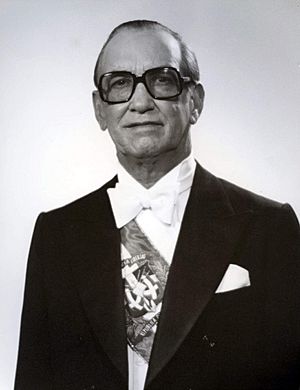Antonio Guzmán Fernández facts for kids
Quick facts for kids
Antonio Guzmán
|
|
|---|---|
 |
|
| President of the Dominican Republic | |
| In office August 16, 1978 – July 4, 1982 |
|
| Vice President | Jacobo Majluta Azar |
| Preceded by | Joaquín Balaguer |
| Succeeded by | Jacobo Majluta |
| Personal details | |
| Born | February 12, 1911 La Vega, Dominican Republic |
| Died | July 4, 1982 (aged 71) Santo Domingo, Dominican Republic |
| Nationality | Dominican |
| Political party | Dominican Revolutionary Party |
| Spouse |
Renée Klang
(m. 1939) |
| Profession | Agronomist, businessman politician |
| Christening | May 4, 1911 |
Silvestre Antonio Guzmán Fernández (born February 12, 1911 – died July 4, 1982), known as Antonio Guzmán, was a businessman and politician from the Dominican Republic. He served as the President of the Dominican Republic from 1978 to 1982.
Early Life and Career
Antonio Guzmán was born in La Vega, a town in the Dominican Republic. He went to primary and secondary schools in La Vega.
He started working in the fruit export business. Soon, he became a successful rancher, raising cattle and owning a lot of land.
Guzmán was one of the first members of the Dominican Revolutionary Party (PRD), a political group led by Juan Bosch. In 1963, when Juan Bosch was briefly president, Guzmán worked as his Secretary of Agriculture. This job meant he was in charge of farming and food production for the country.
In 1966, he ran for Vice-President with Juan Bosch as the presidential candidate. However, they lost that election to Joaquín Balaguer.
Guzmán tried to become president again in 1974. He was the candidate for a group of opposition parties. But he decided to stop his campaign because he felt the election rules were unfair.
Presidency
Guzmán ran for president once more in 1978, representing the PRD. His running mate, who would be Vice-President, was Jacobo Majluta Azar. As the election results started coming in, it was clear Guzmán was winning. The military tried to stop the counting of votes.
However, many people in the country protested, and there was strong pressure from other countries. Because of this, the vote counting started again. When all the votes were counted, Guzmán had won. This was the first time Joaquín Balaguer had lost an election.
When Balaguer left office that year, it was a very important moment for the Dominican Republic. It was the first time in the country's history that a president peacefully gave up power to someone from a different political party who had won an election. This showed that democracy was growing stronger.
Reforms and Challenges
President Guzmán wanted to slowly improve the social and economic parts of the Dominican Republic. He also worked to build a good relationship with the country's armed forces. He knew it was important to prevent them from interfering in politics.
To do this, he changed some military leaders. He moved or removed officers who didn't support his plans. He also promoted younger officers who believed in his vision. Guzmán also started a program for better training for all military personnel. This program was very successful and became an important part of his legacy.
Politically, Guzmán faced some challenges. The majority of the country's Congress was made up of Balaguer's Reformist Party. This meant they could often stop the new laws and changes Guzmán wanted to make.
Since Guzmán was a wealthy rancher, he understood how to manage money and the economy. He put in place good economic policies. He also improved the public transportation system and increased the minimum wage, which is the lowest amount of money workers can be paid.
Even with these good changes, Guzmán was criticized for not being able to stop the country's economy from slowing down. A major event that made things worse was Hurricane David in 1979. This powerful storm hit the Dominican Republic and caused a lot of damage, slowing the economy even more.
End of Presidency
Antonio Guzmán's presidency ended on July 4, 1982. His Vice-President, Jacobo Majluta Azar, took over as acting President. Majluta served for the remaining 43 days of the four-year term.
See Also
 In Spanish: Antonio Guzmán para niños
In Spanish: Antonio Guzmán para niños

